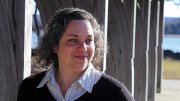
From the book
Joel Derfner’s new book reveals some hidden depths.
“In theater, things move very slowly and it’s difficult to get anything done,” says Joel Derfner ’95. That’s why the song writer and author calls his decision to produce a book largely practical: “I told my editor that, compared to musical-theater writing, [doing a book] is like having a job on Wall Street, in terms of job security and how much you’re paid.”
With Swish: My Quest to Become the Gayest Person Ever (Broadway Books), a personal exploration of contemporary gay culture and sexual identity, Derfner saw himself gaining a little professional stability and making a cultural statement all at once. “I wanted to make Swish fun and accessible and funny,” he explains, but he also kept in mind D.H. Lawrence’s assertion that the essential function of art is moral, not purely aesthetic or recreational.
Given its title, and chapters called “On Dating,” “On Camp Camp,” and “On Exotic Dancing,” the book does run the risk of seeming purely recreational. “I’ve had people come up to me and say, ‘Oh, I picked up your book thinking it’d be fluffy, and then it was actually very moving,’” Derfner reports.
He has made a point of navigating this divide. His first book, Gay Haiku (2005), attempted to make light of some of the more difficult aspects of dating after a bad breakup. In Swish, his chapter “On Casual Sex” relates with a mixture of humor and sadness his attempts at trying to find genuine human connections via that route. In another chapter, he recalls expressing interest in needlepoint and flower arranging at a summer camp when he was six, and being turned away by the camp counselors because those activities were “for girls only.”
His life, or at least the part he represents in his work, suggests that his quest to become the “gayest person ever” was perhaps secondary to self-discovery. One of Swish’s larger projects is to document what he describes as the “slightly unsettling knowledge that I could decide for myself who I wanted to be,” and the effect this knowledge has had on his life.

Deciding who he wanted to be has taken a while. By the time he arrived at Harvard, Derfner says, he had a strong sense of himself sexually, recalling that he was one of two or three people who “showed up gay.” Yet in Swish he writes that he spent considerable time after college rediscovering his sexuality.
He also thought a lot about the trajectory of his career. In college, he focused on becoming a classical singer and considered musicals foolish (“Who communicates in rhymed song?”) until a stomach condition affected his voice. Then he changed his mind, getting involved with Gilbert and Sullivan and similar shows. And in one week during his senior spring, he inspired himself by writing a musical of his own: a half-hour work about the Gina Grant admissions scandal.
Moving to New York, he earned an M.F.A. in musical theater writing from NYU’s Tisch School of the Arts. He also spent interludes as a personal trainer, a personal assistant, an aerobics teacher, and an exotic dancer: “like I was cobbling together one career out of six or seven smaller ones,” he says. Reading Swish suggests that such unexpected turns aided the evolution of the artist over time.
Perhaps because he’s discovered how his work, particularly Swish, is so tied to his own life, Derfner resists trying to imbue the book with too much political meaning. “I don’t necessarily feel that it’s an activist book,” he says. “But I do feel that, insofar as it’s about trying to be as human as possible and trying to find compassion in as many situations as possible, it is an activist effort.”
~Kameron A. Collins








